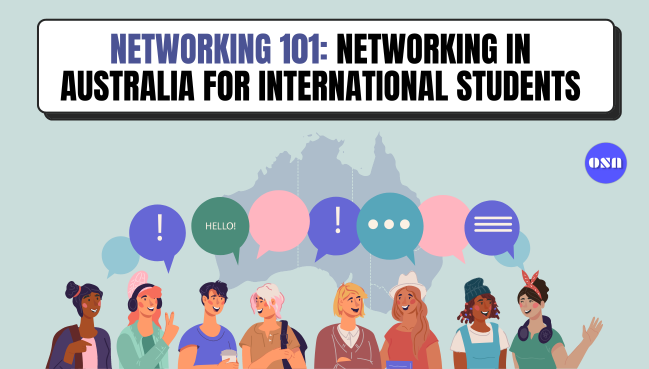Networking 101: Networking in Australia for international students

If you are an international student or a new migrant in Australia, you might be looking for a professional job in Australia.
And you might have heard people talking about the importance of networking to get a job in Australia but how to do it properly is the question not many will answer.
In this blog, we will give you a step-by-step guide on how to do networking in Australia, The Right Way.
And along the way we also will give you some key tips about things that you should do and not do when doing networking and other some useful information.
So, if you’re serious about getting a professional job in Australia, this blog is a must-read for you.
Let’s go, so first things first…
What is Networking?
It can be explained in two words: Building Relationships.
Networking is all about building relationships with like-minded people usually within your own professional industry.
You can also build your network outside your industry as well, but since we are talking specifically about networking for jobs, it is ideal to do it within your own industry.
What is the purpose of Networking?
The aim of networking is to exchange information, ideas, knowledge and importantly opportunities as well.
So by doing networking, we also try to build a support system that is mutually beneficial, which means benefiting both the parties involved.
Why is networking so important to get a job in Australia?
You might have heard about the statement “It’s not only about what you know, it’s about who you know”.
In short, the statement empahises the importance of building the network. Let’s get into specifics:
- First and the most important benefit is career progression, which is helping us to get job opportunities via networking.
- It also helps to expand our knowledge among certain topics or within the industry.
- It can also help to create a support system that you can call upon when you needed.
What are the types of networking in Australia?
In Australia, you can do networking in 2 ways:
- Formal networking
- Informal networking
You can do formal networking via:
- University events
- Student clubs or associations
- Professional associations events
- Language exchange events
- Career Fairs
- Exhibitions
- Seminars
- Conferences
- Online events like webinars etc.
Informal networking can be done through:
- Online platforms like apps and social media networks
- Networking through Sports Club
- While doing some volunteer work
- Religious place that you visit regularly (e.g. Church, Temple, Mosque etc.).
What are some of the popular apps here in Australia for networking?
There are many apps, but our top pick includes 3 main apps that you should focus on when looking for networking opportunities in Australia.
1. LinkedIn.
LinkedIn is the most popular social media platform for professionals.
And if you’re serious about getting a job in Australia, you need to be on LinkedIn.
And it is not only about being there but also having a professional profile so when you approach someone, you look professional.
Want to know how to create a professional LinkedIn profile? We have a checklist for that.
Download it here: https://beacon.by/overseas-students-australia/linkedinprofilechecklist
2. Meetup
Meet up is also a social media platform, but it is specifically designed for events, activities, gatherings for like-minded people.
Many people use this app to find networking opportunities in Australia.
3. Eventbrite
Eventbrite is also designed for events happening around the world, and it is a very popular app in Australia as well.
Keep in mind that some of the events could be paid events as well.
Bonus: Social Media Apps
You can use some other social media apps like Facebook groups, WhatsApp groups, etc.
And Gumtree can be used for networking as well.
Important: Please beware of the scammers in the apps mentioned above. You need to be vigilant and check the organisers history as well before booking or paying money for these events.
Be extra cautious!
Step by step how to do networking in Australia
Now, let’s get into the business side of things, which is about the steps you need to take in order to network in Australia.
Imagine you’re an international student pursuing a Bachelor’s degree in Australia and aspiring to work in the accounting industry.
So what are the steps you need to do in order to build your network?
Let’s go through them.
Step 1: Having clear goals and objectives
Before you even think about networking, you will need to be clear with your goals and objectives for the networking.
What are you hoping to achieve by doing this networking?
As a student, it could be:
- you are looking for an internship while you are still studying
- or you’re looking for a job after your graduation
- or you just want to get some mentorship from someone experienced
- Or it is about just getting knowledge in the industry
Your goals and objectives for networking will define everything else.
Step 2: Find the networking opportunities
You need to research about where these networking opportunities are coming up in your professional industry.
Let’s say you are interested in the accounting industry, so you have to find those networking opportunities in the accounting industry.
You can find out about these networking opportunities via the apps that we just mentioned earlier.
Once you have identified a few of these opportunities, then you need to list down which ones are the most relevant ones.
We suggest you go as many as you can, but you have to be realistic regarding how many you can attend with your study and work schedule.
With our example above, it could be an event organised by CPA Australia for accounting students that you want to attend.
Step 3: Research the event details
Once you know the event you are going to and booked your tickets, you need to do further research about the event itself.
It could be about:
- Details about the event
- Agenda of the event
- Speakers in the event
You can find these details via the event’s website or ask the organisers for details.
Step 4: During the event
Once you are in that specific event, you need to be approaching people nicely and professionally.
If you already know who you want to speak to, don’t hesitate to go up and speak to them.
Make sure to introduce yourself properly. For that, you need to prepare an elevator pitch.
An elevator pitch is basically a short, sharp introduction about yourself. Imagine being in an elevator or a lift, and you have to introduce yourself to someone within a few seconds.
Also, while you’re speaking with these people, you need to appear confident and try to bring in the best body language as well.
You have to actively listen to their conversation and advice when you’re speaking to them.
Our suggestion will be not to ask for jobs during these events (unless it is career related event) because it leaves an impression of a desperate person.
Instead of that, ask for advice from them.
Tell them you are a student who’s studying an accounting course, and you’re really keen to get into this industry, and you’re seeking some advice from them, who are experts in the industry.
So don’t hesitate to ask for advice.
Once you’ve done talking with them. You can move on to other people in the event.
Before you do move on to the next person and if you want to stay in touch with the person you spoke with then follow the next step.
Step 4: Exchange your contact details
Exchanging contact details is one of the most common things that happen during the networking event.
The purpose of getting their contact details is usually to follow up with them after the event.
Step 5: Follow up
After 2 to 3 days of the event, make sure to follow up with some of the people you’re really interested in talking further with.
When contacting them, show your genuine appreciation for the valuable time they spent with you during the event.
You can also ask if there is a possibility for another catch up for a coffee, etc. If they agree, use the opportunity to further strengthen the relationship and discuss potential career guidance and mentorship.
Ideally, stay in touch with them in order to be more visible. It could be through LinkedIn by engaging with their content or via sending them a text or email regularly.
So that is how you can network with people in Australia.
Things we need to do and not to do when networking in Australia
Before we end the article, here are a few do’s and don’t that you should be mindful when networking in Australia:
1. You should always focus on getting advice or mentorship at the beginning.
As time goes along, there might be opportunities that you can ask for. But do not ask in the very first or the second meeting itself.
2. Get Business Cards: The next thing we suggest you do is print a few business cards that you can use for exchanging contact details.
Whether you want to use physical business cards or digital cards, it is completely your choice though.
3. Dress Professionally: When you are going to any of these events, make sure to dress professionally, especially, if it is a formal event.
If you are male, then we suggest you wear a suit and a tie and for the females can wear a professional dress with a blazer. Also spend some time on your grooming and put on some nice aftershave or perfume to leave a lasting impression.
4. Positive body language: Make sure you are showing genuine interest in others by nodding your head and body posture when you’re listening.
5. Be mindful of the personal space: People in Australia usually don’t like to get too close to each other. So make sure to give enough personal space to the people you are speaking with.
6. Remember the people’s name: It will be great if you can remember people’s names and recall them when meeting next time.
7. Meet as many people as you can: Do not get stuck with one or two people only during the event. Networking events are organised to meet as many people as you can. So try to meet as many people as you can and try to exchange your information with as many people as you’re genuinely interested in.
So, this is how networking is done in Australia. Hopefully this guide gives you clear information about networking in Australia. If you liked this article, you will love reading about our guide on Australin workplace culture.


